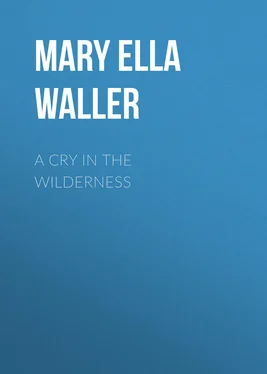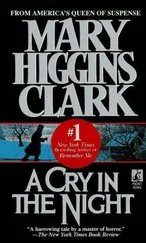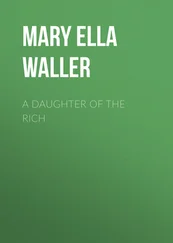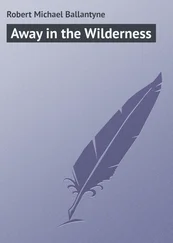Mary Waller - A Cry in the Wilderness
Здесь есть возможность читать онлайн «Mary Waller - A Cry in the Wilderness» — ознакомительный отрывок электронной книги совершенно бесплатно, а после прочтения отрывка купить полную версию. В некоторых случаях можно слушать аудио, скачать через торрент в формате fb2 и присутствует краткое содержание. Жанр: foreign_prose, foreign_antique, на английском языке. Описание произведения, (предисловие) а так же отзывы посетителей доступны на портале библиотеки ЛибКат.
- Название:A Cry in the Wilderness
- Автор:
- Жанр:
- Год:неизвестен
- ISBN:нет данных
- Рейтинг книги:4 / 5. Голосов: 1
-
Избранное:Добавить в избранное
- Отзывы:
-
Ваша оценка:
- 80
- 1
- 2
- 3
- 4
- 5
A Cry in the Wilderness: краткое содержание, описание и аннотация
Предлагаем к чтению аннотацию, описание, краткое содержание или предисловие (зависит от того, что написал сам автор книги «A Cry in the Wilderness»). Если вы не нашли необходимую информацию о книге — напишите в комментариях, мы постараемся отыскать её.
A Cry in the Wilderness — читать онлайн ознакомительный отрывок
Ниже представлен текст книги, разбитый по страницам. Система сохранения места последней прочитанной страницы, позволяет с удобством читать онлайн бесплатно книгу «A Cry in the Wilderness», без необходимости каждый раз заново искать на чём Вы остановились. Поставьте закладку, и сможете в любой момент перейти на страницу, на которой закончили чтение.
Интервал:
Закладка:
I 've lived three days on a half a pound of walnuts, half a pound of cheese and a loaf of bread—and walked my feet sore looking for a place. I know I could have had two places, but I dared not engage to the women. That woman in the Grand Central Station haunts me; these two women had a look of her! One wanted me in private manicure rooms to learn the trade; she said I had the right kind of fingers after the rough had worn off. The other wanted me to show rooms to rent in a queer looking house. Mrs. T. told me to keep away from it and all like it.
Dec. 1. I 'm not only hungry, I 'm cold too. I bought two pails of coals, and paid high for them so Mrs. T. says. They say there is going to be a coal famine from the great strike. It makes me mad that it should all pile up on me in this way! Why can't I have work? Why, when I am willing, can't I find a place?
An awful feeling comes over me sometimes, when I am turned down at a place I 've applied for: I want to throttle the first well-dressed man or woman I meet and say, "Give me work or I 'll make it the worse for you!" Then I turn all dizzy and sick after that feeling, and hate myself for the thought; it's so unjust.
Dec. 10. I asked Mrs. T. if I might n't pay by the week and at the end of each week. I think she knew what the trouble was. She hesitated for a minute, and that was enough for me.
"Oh, I can pay you," I said, "only it's a little more convenient."
"Then I 'd like you to," she said in her queer dry voice.
I hated her at that moment. I went up stairs to my bare room and took off the knit woollen petticoat I made for myself at home, just before coming down; I took that and a set of gold beads, that were my grandmother's, and went out with them to a pawnbroker's just around the corner on the avenue. I got eight dollars for the two of them, and made the time in which to redeem them one month. Then I went back to the house and paid her. She looked surprised, but her skinny hand closed upon the money as if she, too, had no more for the morrow. I don't know that she has. The students come and go.
Dec. 14. I stood on Twentieth Street near Broadway to-day, watching the teamsters unload the heavy drays at the back of a department store. I found myself envying them—they had work.
Dec. 15. I am not up to date with my clothes, and I have no money to make myself so. I find it is for this reason I am "turned down" at so many places where I apply. I read it in men's eyes, in the women's hard stare.
Dec. 17. A man offered to clothe me for a position in a shop, if I would—
I know I looked at him; I think I saw him, or perhaps the beast that was in him. Then I saw queer lights before me, red and yellow—if I had been a man I would have taken him by the throat. When, at last, I could see again, the man was gone. Good riddance! There is such a thing as day nightmare.
Dec. 19. I am beginning to understand how it is done; how the fifteen dollar waists, the diamond rings, the theatre, and the suppers after, can be had without work.
Dec. 20. The strike is on. I should have to do without coals, strike or no strike, for I have nothing to buy them with. Mrs. Turtelot offered to let me heat my food on her stove—my food! I 've lived on one loaf of bread and a can of baked beans for seven days—and to-day I 've been down to the Washington Market just to smell the evergreens that, for all I have no home, give me a homesick longing for the country. But I will not go back; I 'll starve here first.
Afterwards I walked up to Twenty-third Street, and lost myself there in the holiday crowds. What throngs!—jostled, pushed, beset by vendors, loaded with bundles, yet so good natured! No one looked hungry. I stood on the kerb to watch the men selling toys and birds; to listen to the strange cries, the shrilling of the wooden canaries and the trill of the real ones; to peep into the rabbit hutch, and the basket of kittens; to stroke an armful of sleeping puppies; to smell the fragrance of roses and violets and carnations; to smile a little at the slow-moving turtles, the leaping frogs, the Jack-in-the-box, the mechanical toys of all kinds that performed on the sidewalk, each the centre of a small crowd. Then, at twilight, the flare from the chestnut vendor's stand, the little electric lights of the Punch and Judy sidewalk show, the electric torches that the children were carrying, the brilliant whirligigs for advertisements, gave to the whole scene a strange unreal appearance. Men, women, children, Christmas trees, dogs, birds, electric cars, rabbits, kittens, a goat, cabs, automobiles, express carts, surged into the flare and glare, first of one light then of another, till what was shadow and what was substance I failed to make out.
Dec. 21. At last, oh, at last, there is work for me,—for me, too, among all these millions! But it makes me sick to know there must be some who are trying and never find.
I have taken a place in a small writing-paper factory. It's down near Barclay Street, in the loft of a crazy old building, three wooden flights from the street. The loft is lighted at both ends by windows and in the top by skylights. It is heated by a large cylinder stove in the centre, and a small glue box-pot at one end. The air is close, but I don't care much, for it is so warm. I get four dollars a week.
I can manage to live, at least, on this. I can think about nothing else to-night.
Jan. 15, 1903. The coal strike is on. It is cold in the loft, for we have to be saving of fuel. It takes all I can save to buy three pailfuls of coal a week for my little stove. I kindle my fire at night, heat water, cook my cereal, or bean soup, and am comfortable till morning; the room is decently warm to dress in. I am off to work at seven. Fuel and rent and some necessary underclothes leave little for food. I cannot redeem my petticoat, and gold beads which my grandmother had from her mother, Marcia Farrell.
July 6. Hot, hotter, hottest in the old fire-trap of a loft. The sun beats down through the skylights till we get sick. Two of the girls fainted this afternoon.
Aug. 4. I discovered the Public Library to-day! It means so much to me that I simply can't write a word about it.
Nov. 4. Just a year ago to-day since I came here. I am able to draw a free breath for the first time, to look about me and plan a little for my future. I 've made up my mind to study for the examinations for a place in the Public Library. My district school was no bad training, after all, for this work. It taught me one lesson: to put my mind on what was given me to do—and I have not forgotten it.
The extra time for study at night will take more fuel and oil, but I can make that up by living a few more days every week on bean soup. I 've made living on four dollars a week an art this last year. An art? Yes, rather than a science; and, like an art, it accomplishes surprisingly satisfactory results—results that science, with all its proven facts, from which it deduces laws of hygiene, fails to produce.
I honestly believe that I 'm better fed than half the theological students. They scrimp and save—for a theatre ticket! They're a queer lot! I 've asked half a dozen to tell me what they 're aiming at, and not one of the six could give me a sensible answer. If they had said right out—"It's an easy way to get a small living," I would have respect for them. We all have to earn our living in one way or another.
March, 1904. Desk assistant in a branch of the Library—at last!
October, 1906. When I came down here I made a vow to put everything behind me; forget what I had left in New England, the memories of those hard-worked years, and start afresh; cut loose from all the old associations. I have succeeded fairly well. This new life of books is a wonderful one. I like my work as desk assistant in the Library, and I get nine dollars a week. This is wealth for me; I am saving. I have so much besides: the river and the ferries for a change; one trip up the Hudson—a thing to live on for years until I get another. Sometime I mean to travel—sometime! Meanwhile, I go on saving in every possible way.
Читать дальшеИнтервал:
Закладка:
Похожие книги на «A Cry in the Wilderness»
Представляем Вашему вниманию похожие книги на «A Cry in the Wilderness» списком для выбора. Мы отобрали схожую по названию и смыслу литературу в надежде предоставить читателям больше вариантов отыскать новые, интересные, ещё непрочитанные произведения.
Обсуждение, отзывы о книге «A Cry in the Wilderness» и просто собственные мнения читателей. Оставьте ваши комментарии, напишите, что Вы думаете о произведении, его смысле или главных героях. Укажите что конкретно понравилось, а что нет, и почему Вы так считаете.












